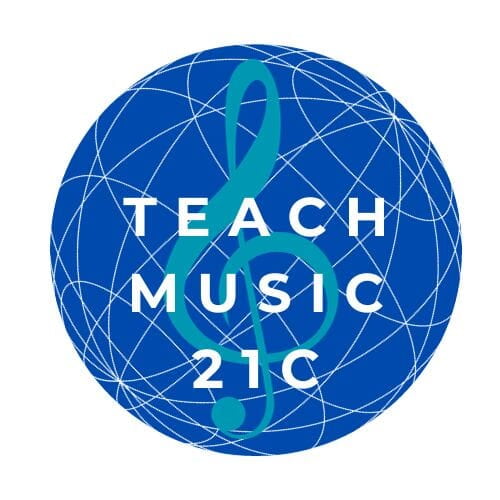Please enjoy this guest post from Michelle Kennedy Hawkins, a piano teacher member of the Teach Music 21C community. Thanks so much Michelle for sharing your thoughts in this informative blog.
The longer I teach, the more comfortable I feel reaching out to the families of my students to touch base, ask questions, and converse with them about their child’s learning journey. I increasingly value communicating with them. The more I have a 2-way dialogue with them, the more we create a team, and the more we understand each other’s approach in how we support the student. I repeatedly throughout the year encourage the families to reach out to me if they have any questions, difficulties, or requests, whether big or small. I ask them to reach out to me sooner rather than later, as I’ve discovered problems are much easier to deal with in early stages rather than after weeks of difficulty, and a question answered early avoids having a week “wasted” by a blockage in practicing due to a small confusion.

Challenges of Multiple Platforms
For the day-to-day communications of things like updates about recital details, or lesson rescheduling, etc. I find there is not one single way that works well for all my students’ families. Each family has a preferred way to receive and respond to messages. Some of my families notice and respond quickest to messages on What’s App, some do best by email, and many do best by text. Others are swiftest on facebook Messenger, or I have a piano teacher friend whose families like to see updates on a facebook page. I have one family that is best to call or tell information to face-to-face because written communications tend to get misread. These permutations of how to send messages can be a hassle to manage. I know some teachers will reinforce to their families that, “I’ll only communicate by email,” so that they don’t have to manage so many platforms. For communications I am sending everyone, I have started composing the message on google Keep or in Word then quickly cutting and pasting it into the various apps, or I save the message on the cloud then just sending out the link to everyone on the various apps. Sometimes I send it to all as an email but then send the briefest text and WhatsApp message, “Please check your email for an important message.” I don’t know what the best solution for this is, I am interested in reading your comments and ideas!

Intentionally Checking In – Building a Routine
Besides chatting with families in an organic way as random opportunities arise during the teaching year, and besides the basic info update messages about recitals, etc., I also like to have certain check-ins built into my routine so that I don’t accidentally go too many weeks without communication during the flurry of the teaching year. Here is my routine as it is now:
August Mailing – via email and snail mail/printed copies
Includes a link to start of year form, asking not just for phone numbers, etc., but also about students’ backgrounds, requests of what to learn, how practicing went at home last year, etc. See a sample version of this year’s form here (the interesting parts are sections 4-6):
https://forms.gle/cvhpVJtHsF5YxJPJ7
Includes a sign-up link to book an in-person Family-Teacher interview/conference
Mid-year check in – I've done this in various ways over the years. Here are a few:
Phone call – I give them some questions to ponder, before we have the call, about any requests of what to learn, questions, observations about what is working well or might need adjusting
Another in person Family-Teacher interview/conference
Google form – like the start of year google form, but much shorter
Mingle and chat: Purposefully try to mingle and chat with families after recitals, or at our local music festival.
Building a sense of community and connection through face-to-face interactions as part of these events helps me gain a sense of how things are going for families and, I think, helps them feel more comfortable in approaching me about anything that might come up in their child’s music journey, or in the rest of their lives that might affect the child’s learning or how they act in their lessons. It is also another chance for me to encourage them to feel comfortable contacting me.
Family comments on our lesson note pages
A few of my families helpfully jot a brief comment beside items on the lesson notes/practice list, such as if a student struggled with something, or if they loved playing a certain song, or if they skipped practicing any songs on the list. I find these insights extremely helpful, steering my approach to those items in our lesson.

Posting information online and programmed/scheduled messages
google classroom- I plan to post schedules and recital reminders, plus videos for families with ideas to help students practice, videos explaining things like posture or what performing in our local festival is like, etc., on google classroom this year since my students’ families are on google classroom anyway to access links to youtube rhythm clap-alongs, vocal warm-up recordings, links to online music games, videos about music theory, and more anyway. Students and their families can post comments about posted activities and videos, which I love reading, as they tell me which ones they loved or which ones they struggled to do.
Scheduling texts or emails for auto send out.
I have found having my students’ families in a group text has been helpful for sending reminders or quick updates. I remind them it is a group text so if they want to ask me something specific to their child for them to text me individually. I love being able to type a text up late at night but set it to delay-send the next morning.
Other online communications colleagues have used:
My Music Staff – some teachers have their calendars on here, program emails to go out at certain scheduled times, and more
Website
Facebook page
Monthly Emailed Newsletter
Insights and Community
Communicating frequently, especially encouraging a back-and-forth dialogue with the families, can bring beneficial insights into a student’s music journey which can help us tailor our approach to best suit the student. It also builds a sense of community, a sense of comradery and teamwork, which is a great environment in which to raise young musicians!
What are some of the ways you facilitate communication with students’ families? What is working well? What challenges are you facing?
